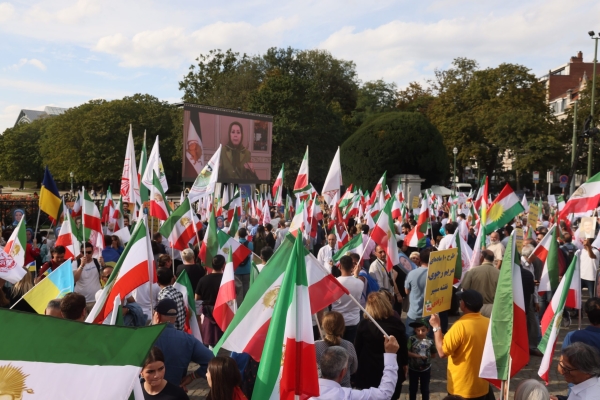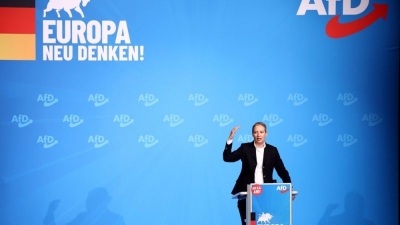Opposition leader: All Signs Point to the End of the Mullahs’ Regime in Iran

Addressing thousands of representatives of the Iranian diaspora in Europe, the Iranian opposition leader Maryam Rajavi said on Friday that all signs point to the end of the ruling theocracy.
Rajavi was addressing a major conference in Brussels on Friday on the eve of the first anniversary of the Iranian people’s uprising that began after the tragic death of Mahsa (Zhina) Amini. According to Rajavi, the uprising highlighted the potential for the regime’s downfall and has put the Iranian people on the cusp of a new era in their history, backed by four decades of organized resistance.

Former Canadian Prime Minister Stephen Harper, former Belgian Prime Minister Guy Verhofstadt, former Colombian presidential candidate and former hostage Ingrid Betancourt, former German Defense Minister Franz Josef Jung, and the former French Foreign Minister Michèle Alliot Marie were among the international dignitaries who participated in the summit organized by the National Council of Resistance of Iran (NCRI), a coalition headed by Iran’s leading domestic opposition group, the People’s Mojahedin Organization of Iran (PMOI/MEK).
Representatives of the Belgian Parliament and cross-party delegations from the European Parliament and the parliaments of European countries including Italy, Ireland, and Iceland also participated in the conference held at the capital of Europe.
Maryam Rajavi, the NCRI President-elect, stressed: “In this uprising, the world clearly saw a regime that covered its instability with warmongering and terrorism, and by making noise about its missile and nuclear programs. In reality, it is sitting on a powder keg and has no future. And when brave women and girls—the main force of change—stood up on the front lines, it became clear that the transformation taking place in Iran has such intensity and depth that it will inevitably lead to the downfall of the religious dictatorship and bring about a free Iran.”
She emphasized “The factors that led to the eruption of the uprising have not only not diminished, but have even become more intense, concentrated, and severe.”
“The society’s adversarial approach towards the regime of executioners, which became evident during the uprising, has clearly increased. The organized resistance and the Resistance Units within the country, along with the PMOI social networks, have focused their activities on breaking the wall of repression, initiating uprisings, and expanding them. While the regime’s oil revenues have increased, the policy of plundering public assets and impoverishing the masses has heightened the explosive potential and increased social readiness for uprisings. In such a situation, the regime inevitably resorts to more control, suppression, and contraction,” Rajavi underscored.
AdvertisementThe conference participants, representing a wide range of political tendencies, strongly condemned the regime’s crackdown of the protesters, expressed support for the Iranian people’s uprising and stressed that the West has a moral responsibility to stand on the side of the Iranian people, particularly the youth, as they strive to bring about regime change.
According to the PMOI (or MEK) network, at least 750 protesters were killed and 30,000 were arrested during last year’s uprising. Part of the venue for Friday’s conference was devoted to an exhibition for the victims of the crackdown.
While emphasizing the role of MEK-affiliated Resistance Units, conference participants stressed that the slogans in the streets of Iran, like “Down with the oppressor, be it the Shah or the Leader”, clearly showed that the Iranian people reject both the former Shah’s dictatorship and current theocracy and are seeking to establish a democratic republic that is chartered in Maryam Rajavi’s ten-point plan. In recent months 3,600 parliamentarians from around the world, 124 former presidents and prime ministers, and 75 Nobel laureates have expressed their support for that plan.
“The ruling clerics in Iran have never been more in need of appeasement than they are today. Under the immense impact of uprisings, they need diplomatic maneuvering more than ever before. They are trying to win the support of both the West and the East against the people of Iran and their democratic revolution. Their methods for coercing Western governments are known. Hostage-taking, terrorism, warmongering, and playing the nuclear card are their tactics. Their central demand from Western governments is to limit the PMOI and the NCRI, and to close the path to uprising and freedom in Iran,” Rajavi stressed.
She called on the West to declare the IRGC a terrorist organization, recognize the Iranian people’s right to defend themselves against the IRGC and other suppressive forces, reactivate the UN Security Council’s six resolutions against the Iranian regime, refer the dossier of human rights violations in Iran to the UN Security Council, prosecute the regime’s leaders for four decades of genocide and crimes against humanity, and place the clerical regime under Chapter VII of the UN Charter as a threat to world peace and security.
In part of his speech, former Canadian Prime Minister Stephen Harper said that the last time the protesters burned Khomeini’s ancestral home. Next time they will burn down the whole regime. Dismiss the propaganda that the regime is entrenched and has no organized opposition. If such opposition did not exist, why would the regime engage in such demonization against the NCRI and why would it imprison 3,500 members of your resistance. There is an alternative to offer to the Iranian people. It is simple. Stand with the Iranian Resistance and their desire for a democratic, secular state. This is what the NCRI has long advocated.
He was followed by former French Foreign and Defense Minister Michèle Alliot Marie, who said, “We all aspire for freedom, equality between men and women, democratic regimes. Today is a double anniversary, a tragic one, with the death of Mahsa Amini, who was tragically killed tragically. But also, September 15 marks the wave of demonstrations in Iran following the death of Amini. After September 2022, there was a change in the approach. Essential change can only be accomplished by the Iranian people. Freedom, democracy, and gender equality are worth fighting for.”
Belgium former Prime Minister Guy Verhofstadt added that since the death of Mahsa Amini, we have seen something historic in Iran, with men and women risking their lives and call for the overthrow of the regime. They were chanting ‘death to the oppressor, be it the Shah or the Supreme Leader.’ The conditions in Iran have deteriorated to the detriment of the regime and to the benefit of the Iranian people. The regime’s execution of dissidents has not stopped the wave of protests. The silence and inaction by the EU and other western countries empowers the regime’s reign of terror. We must have a firm policy vis-à-vis the regime, a strategy of change in Iran. EU must engage the NCRI. Friday’s summit also featured formal announcement of the formation of a Congress of Iranian youth living in Europe, including the youth who have left Iran in recent years.
Rajavi’s speech was repeatedly interrupted by chants and applause from the enthusiastic crowd who had gathered from all over Europe. It strongly criticized the current policy of the West on Iran and warned that continued appeasement of religious fascism is both helping the murderers who are firing on the people of Iran and endangering global peace and security, including the security of Europe itself.
After the meeting, thousands of supporters of the National Council of Resistance of Iran took part in a demonstration and orderly march in Brussels.
Share this article:



